Related Research Articles
A member of parliament (MP) is the representative in parliament of the people who live in their electoral district. In many countries with bicameral parliaments, this term refers only to members of the lower house since upper house members often have a different title. The terms congressman/congresswoman or deputy are equivalent terms used in other jurisdictions. The term parliamentarian is also sometimes used for members of parliament, but this may also be used to refer to unelected government officials with specific roles in a parliament and other expert advisers on parliamentary procedure such as the Senate Parliamentarian in the United States. The term is also used to the characteristic of performing the duties of a member of a legislature, for example: "The two party leaders often disagreed on issues, but both were excellent parliamentarians and cooperated to get many good things done."

Haradanahalli Doddegowda Deve Gowda is an Indian politician who served as the 11th prime minister of India from 1 June 1996 to 21 April 1997. He was previously the 14th Chief Minister of Karnataka from 1994 to 1996. He presently is a Member of Parliament in the Rajya Sabha representing Karnataka. He is the national president of the Janata Dal (Secular) party.Born in a farming family, he joined the Indian National Congress party in 1953, and remained a member until 1962. He was imprisoned during the Emergency. He became President of the state unit of Janata Dal in 1994, and was considered to be a driving force in the party's victory in Karnataka. He served as the 8th Chief Minister of Karnataka from 1994 to 1996. In the 1996 general elections, no party won enough seats to form a government. When the United Front, a coalition of regional parties, formed the central government with the support of the Congress, Deve Gowda was unexpectedly chosen to head the government and was elected Prime Minister. During his tenure as prime minister, he also served as Home Minister for some time. His prime ministerial tenure lasted for less than a year. After his prime ministerial tenure, he was elected to the 12th (1998), 14th (2004), 15th, and 16th Lok Sabha, as Member of Parliament for the Hassan Lok Sabha constituency. He lost Lok Sabha elections in 2019 from Tumkuru but has been elected to Rajya Sabha since.
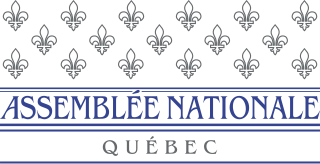
The National Assembly of Quebec is the legislative body of the province of Quebec in Canada. Legislators are called MNAs. The King in Right of Quebec, represented by the lieutenant governor of Quebec and the National Assembly compose the Legislature of Quebec, which operates in a fashion similar to those of other Westminster-style parliamentary systems. The assembly has 125 members elected first past the post from single-member districts.
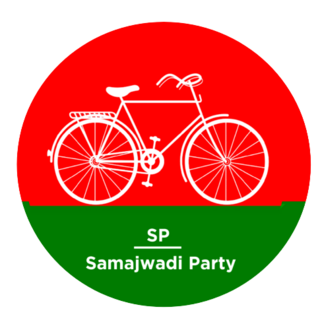
The Samajwadi Party is a socialist political party in India. Headquartered in New Delhi, the party is based in Uttar Pradesh with a significant presence in other states too. The party has been able to form the government in the state of Uttar Pradesh four times - three times under Chief Minister Mulayam Singh Yadav, the fourth and most recent being Chief Minister Akhilesh Yadav’s full majority government in the 2012-2017 Uttar Pradesh Legislative Assembly. The coalition of party and its alliance partners SP+ has one of the largest vote bases in the state of Uttar Pradesh in terms of the collective voting pattern in the state-based electoral system, with more than 37% vote share in the 2022 elections.

The Prime Minister of Vietnam, officially styled as the Prime Minister of the Government of the Socialist Republic, is the head of government of Vietnam who presides over the meetings of the Central Government. The prime minister directs the work of government members, and may propose deputy prime ministers to the National Assembly.
A Member of Provincial Parliament (MPP) is an elected member of the Legislative Assembly of the Canadian province of Ontario. Elsewhere in Canada, the titular designation "Member of Provincial Parliament" has also been used to refer to members of the Legislative Assembly of Lower Canada from 1791 to 1838, and to members of the Legislative Assembly of Quebec from 1955 to 1968.

The prime minister of Pakistan is the head of government of the Islamic Republic of Pakistan. Executive authority is vested in the prime minister and his chosen cabinet, despite the president of Pakistan serving as the nominal head of executive. The prime minister is often the leader of the party or the coalition with a majority in the lower house of the Parliament of Pakistan, the National Assembly where he serves as Leader of the House. Prime minister holds office by virtue of their ability to command the confidence of the National Assembly. The prime minister is designated as the "Chief Executive of the Islamic Republic".
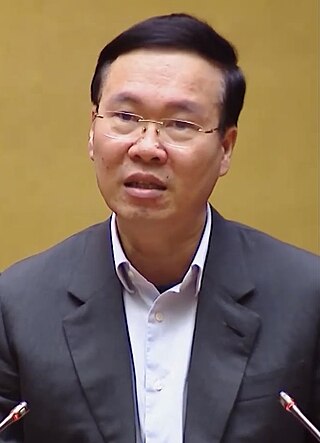
The president of the Socialist Republic of Vietnam is the head of state of Vietnam, elected by the Vietnam National Assembly from delegates of the National Assembly. Since Vietnam is a single-party state, the president is generally considered to hold the second highest position in the political system, formally after the General Secretary of the Communist Party of Vietnam. In addition, the president appoints the head of government, the Prime Minister. As head of state, the President represents Vietnam both domestically and internationally, and maintains the regular and coordinated operation and stability of the national government and safeguards the independence and territorial integrity of the country.
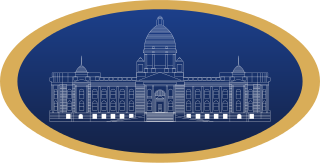
The National Assembly is the unicameral legislature of Serbia. The assembly is composed of 250 deputies who are proportionally elected to four-year terms by secret ballot. The assembly elects a president (speaker) who presides over the sessions.

The National Assembly of Pakistan is the lower legislative house of the bicameral Parliament of Pakistan, which also comprises the Senate of Pakistan. The National Assembly and the Senate both convene at Parliament House in Islamabad, the capital of Pakistan. The National Assembly is a democratically elected body consisting of a total of 336 members who are referred to as Members of the National Assembly (MNAs), of which 266 are directly elected members and 70 reserved seats for women and religious minorities from all over the country. A political party or a coalition must secure 172 seats to obtain and preserve a majority.

The Grand National Assembly of Turkey, usually referred to simply as the TBMM or Parliament, is the unicameral Turkish legislature. It is the sole body given the legislative prerogatives by the Turkish Constitution. It was founded in Ankara on 23 April 1920 in the midst of the National Campaign. This constitution had founded its pre-government known as 1st Executive Ministers of Turkey in May 1920. The parliament was fundamental in the efforts of Mareşal Mustafa Kemal Atatürk, 1st President of the Republic of Turkey, and his colleagues to found a new state out of the remnants of the Ottoman Empire.

The Parliament of Pakistan is the federal and supreme legislative body of Pakistan. It is a bicameral federal legislature that consists of the Senate as the upper house and the National Assembly as the lower house. According to the Constitution of Pakistan, the President of Pakistan is also a component of the Parliament. The National Assembly is elected for a five-year term on the basis of adult franchise and one-man one-vote. The tenure of a Member of the National Assembly is for the duration of the house, or sooner, in case the Member dies or resigns. The tenure of the National Assembly also comes to an end if dissolved on the advice of the Prime Minister or by the president in his discretion under the Constitution.
The State Legislative Assembly, or Vidhan Sabha, or also Saasana Sabha, is a legislative body in the states and union territories of India. In the 28 states and 3 union territories with a unicameral state legislature, it is the sole legislative body and in 6 states it is the lower house of their bicameral state legislatures with the upper house being State Legislative Council. 5 union territories are governed directly by the Union Government of India and have no legislative body.

The prime minister of Cambodia is the head of government of Cambodia. The prime minister is also the chairman of the Cabinet and leads the executive branch of the Royal Government of Cambodia. The prime minister is a member of parliament, and is appointed by the monarch for a term of five years. Since 1945, 36 individuals have served as prime minister; 32 as official prime ministers, and 4 in acting capacities. Hun Sen, of the Cambodian People's Party, has been the incumbent prime minister since 1985. He served from 1985 to 1993 and was Second Prime Minister from 1993 to 1998 alongside Norodom Ranariddh (1993–1997) and Ung Huot (1997–1998). Elected as prime minister in his own right in 1998, he is the longest serving prime minister in Cambodian history.

Jagadish Shivappa Shettar is an Indian politician, who served as the 15th Chief Minister of Karnataka from 2012 to 2013. He has subsequently served as Leader of the Opposition in the Karnataka Legislative Assembly. He also served as the Speaker of the Karnataka Legislative Assembly during 2008–2009. He is a member of the Indian National Congress. Earlier he was a member of the Bharatiya Janata Party, which he quit on being denied the MLA ticket in 2023. He represented Hubli-Dharwad Central Vidhan Sabha seat, which he resigned in 2023 before the elections.

The National Assembly of the Socialist Republic of Vietnam is the national unicameral legislature of Vietnam.

The Federal Parliament of Nepal is the bicameral federal and supreme legislature of Nepal established in 2018. It consists of the National Assembly and the House of Representatives as parallel houses.
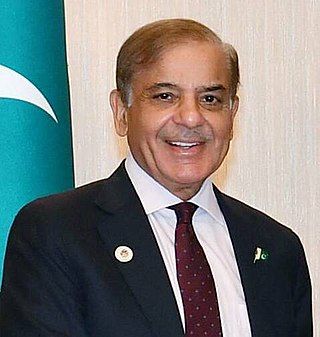
Mian Muhammad Shehbaz Sharif is a Pakistani politician and businessman who is currently serving as the 23rd Prime Minister of Pakistan, in office since 11 April 2022. He is the current president of the Pakistan Muslim League (N) (PML-N). Previously in his political career, he served as the Chief Minister of Punjab three times, making him the longest-serving Chief Minister of Punjab.
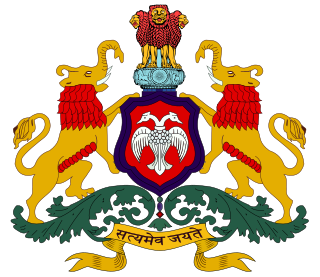
The Karnataka Legislative Assembly, formerly the Mysore Legislative Assembly or Mysore Representative Assembly, is the lower house of the bicameral legislature of the southern Indian state of Karnataka. Karnataka is one of the six states in India where the state legislature is bicameral, comprising two houses: the Vidhan Sabha and the Vidhan Parishad.
State governments in India are the governments ruling over 28 states and 8 union territories of India and the head of the Council of Ministers in a state is the Chief Minister. Power is divided between the Union government and state governments. While the Union government handles defence, external affairs etc., the state government deals with internal security and other state issues. Income for the Union government is from customs duty, excise tax, income tax etc., while state government income comes from sales tax (VAT), stamp duty etc.; now these have been subsumed under the various components of the Goods and Services Tax